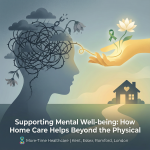Comprehensive nutritional care aims to tackle malnutrition across seniors and children. Malnutrition, also known as undernutrition, is a condition characterised by a lack of essential nutrients in the body. It can result from an inadequate dietary intake or the body’s inability to absorb or utilise nutrients effectively. The primary cause of malnutrition is either a poor diet or underlying health conditions that impair nutrient absorption.

Risk factors
Several factors can increase an individual’s risk of developing malnutrition:
1. Health conditions: Chronic illnesses such as cancer, liver disease, lung conditions (e.g., COPD), Crohn’s disease, ulcerative colitis, dementia, and eating disorders can lead to malnutrition by affecting appetite, nutrient absorption, or increasing energy requirements.
2. Medications: Certain medications can cause side effects like nausea, loss of appetite, diarrhoea, or impaired nutrient absorption, contributing to malnutrition.
3. Physical and social factors: Dental problems, physical disabilities, social isolation, limited mobility, low income, and lack of knowledge about nutrition or cooking can also increase the risk of malnutrition.
4. Age: Both older adults (65 years and above) and children under five years old are particularly vulnerable to malnutrition.
Symptoms

The main symptom of malnutrition is unintentional weight loss, although it is possible to be malnourished without significant weight changes. Other symptoms may include:
– Reduced appetite and lack of interest in food and drink
– Constant fatigue and weakness
– Frequent illnesses and slow recovery
– Slow wound healing
– Poor concentration
– Feeling cold most of the time
– Low mood, sadness, and depression
In children, additional symptoms may include faltering growth, changes in behaviour (irritability, anxiety), and low energy levels.
Treatment

Treatment for malnutrition depends on the underlying cause and severity. It may involve dietary changes, nutritional supplements, or feeding tubes in severe cases. Specific treatments may include:
– Dietary counselling and tailored meal plans by a dietitian
– Fortified foods or nutritional drinks
– Oral nutritional supplements
– Nasogastric or percutaneous feeding tubes
– Parenteral nutrition (intravenous feeding)
For malnourished children, treatment may involve dietary modifications, family support, addressing underlying medical conditions, and close monitoring of growth and development.
Malnutrition is a common problem that can affect individuals of all ages and backgrounds. Early recognition and appropriate treatment are crucial to prevent further complications and promote overall health and well-being.
Here at More-Time Healthcare we will help to deliver a comprehensive, personalised nutritional and well balanced diet to all our patients of all age groups under our care. For an assessment please contact us.











Leave a Reply